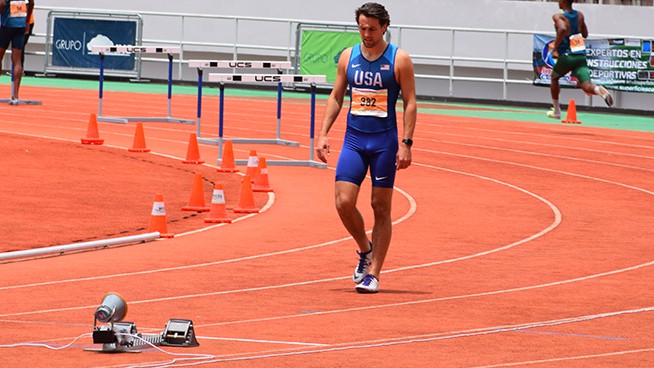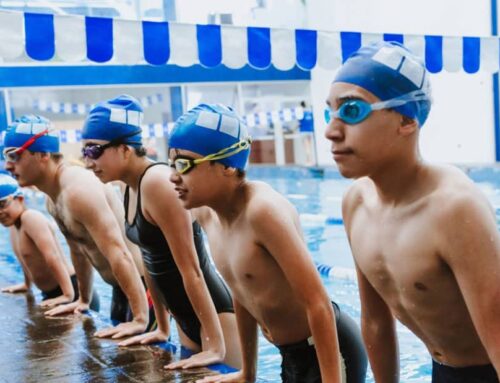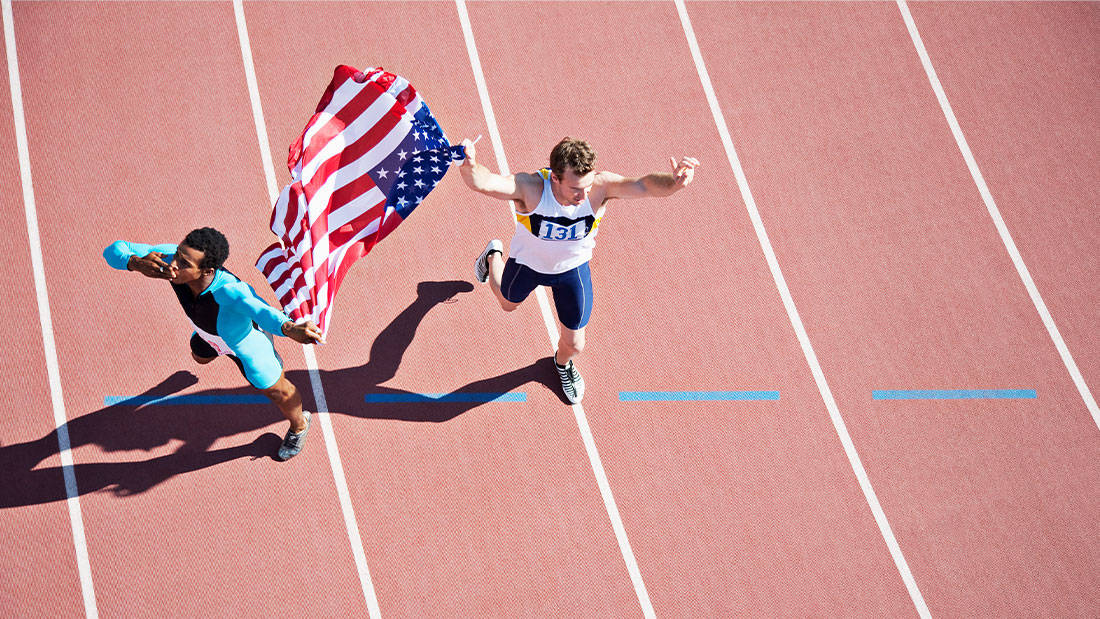Meet Cass Elliott: University of Washington’s 400m Hurdler Talks Track
Cass Elliott got into track as an afterthought. It was a way to stay in shape for football and appease his parent’s “something after school” rule. What started as a last-minute choice between soccer or track has blossomed into an illustrious career as a 400m hurdler.
Elliott is a sprinter for the University of Washington Men’s Track team in his senior year. While his best race is the 400m hurdles, he also runs the open 400m, 800m, distance medley relay, and the 4x400m relay.
His track career is studded with records and success. He demolished the competition at the 3A Washington State meet his junior and senior year in high school, setting the record for the 300m hurdles at 37.11. He represented the USA in the 2019 Pan American Games in Costa Rica. His college career is also studded with appearances at Indoor and Outdoor National meets. And most recently, he was down in TrackTown, USA to run in the Olympics Trials.

How has he achieved such success on the track for someone who wanted to be a pro football player? In August, before he headed back to campus, I had the chance to sit down with him and ask.
STACK: So, how did you get into track?
Cass Elliott: My freshman year of high school, I wanted to play football in college. So I was planning on lifting in the spring to get stronger. But my parents said I needed to participate in an organized activity, so I chose track as a backup.
Then I had a coach say, ‘Hey do you want to try out hurdles?’ So I tried them out and progressed through the season. I ran one of the fastest first races my coach had seen, and by the end of my freshman year I was 9th in state. So I thought, ‘shoot I should probably pursue this a little more.’
STACK: How’d you make the transition from high school to college?
CE: Oh my god thats a long story, that’s seven years worth, so I’ll go a little bit into hyper-speed mode. Alright, my second year, I improved a lot through training and working hard, and my junior year I got first in state and broke the state record. This allowed me to get attention from colleges and go on visits and from there I decided on UW.
STACK: How are the hurdles more or less challenging than other races?
CE: Physically, they are way more challenging because you have to clear ten barriers. You’re running the same all-out sprint of a 400m, but then you have to jump, lose a lot of your momentum and then completely reaccelerate ten times through the whole race.
Then there’s the technical aspect, because your body mechanics are different than straight running. You have to learn a motion that is not very natural, and then learn to do that motion on both sides, so you become ambidextrous in a way.
Mentally, some people say it’s easier, some say it’s harder. For the harder side, you have to stay focused for a full 400m, because if you lose focus, and your foot comes 1/4 inch not quite as high as it’s supposed to, then you clip a hurdle and could lose a ton of momentum. So you have to be locked in on the eight or nine different things you have to be doing over every hurdle.
On the easier side, it can be nice to have those barriers in the race because they give you something to strive for and give you benchmarks. You can break up the race into a nicely-sectioned game plan.
STACK: You’ve achieved a lot of success, which stands out as the most memorable?
CE: Oh 100% my most memorable was making the US Junior Team. I remember being in Florida, it was the finals and I had not been racing very well. I knew I just had to make the top two to make the team and get to the PanAm games.
I vividly remember coming around the final corner and seeing that I was in second, just knowing I was about to make the team. Going over the 9th and 10th hurdle I had this feeling of euphoria, and was thinking, this is the best moment of my life.
STACK: You’ve raced in a lot of high-stakes meets. How do you deal with the pressure?
CE: Okay, for starters, I always like to tell myself that it’s good to have some nerves, because that helps with adrenaline. I don’t know if that’s really true, but it helps with your mindset going in to think ‘hey, this is a good thing’.
Then I think a lot of where nerves come from is expectations. If I feel I have to be this good, or hit this mark, or proceed past this point, it’s just going to cause more anxiety. But if I tell myself, ‘I know what I can do, I know what I’ve done to prepare for this, now I just have to go out and do my best’ it’s easier to get out there without feeling like you have to vomit all over the place.
One of the best ways to deal with anxiety is to be prepared, which comes from the 9-10 months you spend before your race, getting better and making sure you’re at your best when the time comes.
STACK: What does a day in the life look like for you as a college athlete?
CE: If we have weights, which is 2-3x a week, we’ll be up at 7am, lift weights for an hour or so. Then after that, we go to class from 8:30am to 1:00pm. Then you grab whatever food you can for lunch and head back to the locker room to change for practice. We practice for another two to three hours, before showering, going to the dining hall for dinner. In the evening you have time to hang with friends or do homework, and any sort of personal things you want to do.
Practices always consist of a warmup, usually for 30min, then after that it depends on the day. Usually it’s either a speed, speed endurance or endurance training. So that could be sets of 150’s, 200’s, 300’s, 400’s or a mix. Maybe some stuff over hurdles, maybe a hill run. Whatever crazy workout that our coach cooks up.
STACK: What sacrifices do you have to make as a high school athlete and a college athlete?
CE: In high school, because you only practice for two hours a day, if you want to run in college, you need to be willing to put in more time. It’s just about what level you want to get to.
In college, you’re probably going to have to make a lot more sacrifices if you want to be good. Especially because track is a sport where you’re required to be at 100% maximum potential every time you compete, which means it’s tough to indulge in partying or drinking. You’re also going to have to spend less time with friends, less time doing what you want, because you’ll be on campus maybe 10-12 hours a day.
STACK: What inspires you to give your best?
CE: There are many times when I’m on the track and I don’t feel like doing my best, and I just have to get by. But at the end of the day, what keeps me working hard and running track from the most part is something to do post-college. I have an opportunity to be able to travel and experience awesome things while competing as a professional athlete. I would like to go pro and get paid to travel the world and run fast.
STACK: Looking back, is there anything you would do different?
CE: Either start running track earlier. Or play lacrosse or hockey or a sport that more fits my body type. I’d also invest in Bitcoin. Is this track related? In terms of track, I would focus on it sooner, because I didn’t really know. If I had the training I have now back in high school, I could have gone anywhere in the country.
STACK: What advice would you give to young athletes starting in the sport?
CE: Make sure that you really love and are passionate about the sport, because it is so tough, and a lot of times it’s not super fun. But if you are really passionate about it, and want to make it to the next level, or even just improve, just focus on yourself. Set your own personal goals and don’t worry about anything else. You can always get better and you will get better. If you keep running, keep sprinting, keep practicing, you are going to see improvement.
As Cass moves into his senior year at UW, a lot of uncertainty lies in the future. Will he be able to make nationals? Will he be able to drop his time and make it pro? Will the dream that he has been chasing for so long finally be attainable?
While all these questions remain to be seen, one thing is for certain. Track has been the best backup plan he’s ever had
RECOMMENDED FOR YOU
MOST POPULAR
Meet Cass Elliott: University of Washington’s 400m Hurdler Talks Track
Cass Elliott got into track as an afterthought. It was a way to stay in shape for football and appease his parent’s “something after school” rule. What started as a last-minute choice between soccer or track has blossomed into an illustrious career as a 400m hurdler.
Elliott is a sprinter for the University of Washington Men’s Track team in his senior year. While his best race is the 400m hurdles, he also runs the open 400m, 800m, distance medley relay, and the 4x400m relay.
His track career is studded with records and success. He demolished the competition at the 3A Washington State meet his junior and senior year in high school, setting the record for the 300m hurdles at 37.11. He represented the USA in the 2019 Pan American Games in Costa Rica. His college career is also studded with appearances at Indoor and Outdoor National meets. And most recently, he was down in TrackTown, USA to run in the Olympics Trials.

How has he achieved such success on the track for someone who wanted to be a pro football player? In August, before he headed back to campus, I had the chance to sit down with him and ask.
STACK: So, how did you get into track?
Cass Elliott: My freshman year of high school, I wanted to play football in college. So I was planning on lifting in the spring to get stronger. But my parents said I needed to participate in an organized activity, so I chose track as a backup.
Then I had a coach say, ‘Hey do you want to try out hurdles?’ So I tried them out and progressed through the season. I ran one of the fastest first races my coach had seen, and by the end of my freshman year I was 9th in state. So I thought, ‘shoot I should probably pursue this a little more.’
STACK: How’d you make the transition from high school to college?
CE: Oh my god thats a long story, that’s seven years worth, so I’ll go a little bit into hyper-speed mode. Alright, my second year, I improved a lot through training and working hard, and my junior year I got first in state and broke the state record. This allowed me to get attention from colleges and go on visits and from there I decided on UW.
STACK: How are the hurdles more or less challenging than other races?
CE: Physically, they are way more challenging because you have to clear ten barriers. You’re running the same all-out sprint of a 400m, but then you have to jump, lose a lot of your momentum and then completely reaccelerate ten times through the whole race.
Then there’s the technical aspect, because your body mechanics are different than straight running. You have to learn a motion that is not very natural, and then learn to do that motion on both sides, so you become ambidextrous in a way.
Mentally, some people say it’s easier, some say it’s harder. For the harder side, you have to stay focused for a full 400m, because if you lose focus, and your foot comes 1/4 inch not quite as high as it’s supposed to, then you clip a hurdle and could lose a ton of momentum. So you have to be locked in on the eight or nine different things you have to be doing over every hurdle.
On the easier side, it can be nice to have those barriers in the race because they give you something to strive for and give you benchmarks. You can break up the race into a nicely-sectioned game plan.
STACK: You’ve achieved a lot of success, which stands out as the most memorable?
CE: Oh 100% my most memorable was making the US Junior Team. I remember being in Florida, it was the finals and I had not been racing very well. I knew I just had to make the top two to make the team and get to the PanAm games.
I vividly remember coming around the final corner and seeing that I was in second, just knowing I was about to make the team. Going over the 9th and 10th hurdle I had this feeling of euphoria, and was thinking, this is the best moment of my life.
STACK: You’ve raced in a lot of high-stakes meets. How do you deal with the pressure?
CE: Okay, for starters, I always like to tell myself that it’s good to have some nerves, because that helps with adrenaline. I don’t know if that’s really true, but it helps with your mindset going in to think ‘hey, this is a good thing’.
Then I think a lot of where nerves come from is expectations. If I feel I have to be this good, or hit this mark, or proceed past this point, it’s just going to cause more anxiety. But if I tell myself, ‘I know what I can do, I know what I’ve done to prepare for this, now I just have to go out and do my best’ it’s easier to get out there without feeling like you have to vomit all over the place.
One of the best ways to deal with anxiety is to be prepared, which comes from the 9-10 months you spend before your race, getting better and making sure you’re at your best when the time comes.
STACK: What does a day in the life look like for you as a college athlete?
CE: If we have weights, which is 2-3x a week, we’ll be up at 7am, lift weights for an hour or so. Then after that, we go to class from 8:30am to 1:00pm. Then you grab whatever food you can for lunch and head back to the locker room to change for practice. We practice for another two to three hours, before showering, going to the dining hall for dinner. In the evening you have time to hang with friends or do homework, and any sort of personal things you want to do.
Practices always consist of a warmup, usually for 30min, then after that it depends on the day. Usually it’s either a speed, speed endurance or endurance training. So that could be sets of 150’s, 200’s, 300’s, 400’s or a mix. Maybe some stuff over hurdles, maybe a hill run. Whatever crazy workout that our coach cooks up.
STACK: What sacrifices do you have to make as a high school athlete and a college athlete?
CE: In high school, because you only practice for two hours a day, if you want to run in college, you need to be willing to put in more time. It’s just about what level you want to get to.
In college, you’re probably going to have to make a lot more sacrifices if you want to be good. Especially because track is a sport where you’re required to be at 100% maximum potential every time you compete, which means it’s tough to indulge in partying or drinking. You’re also going to have to spend less time with friends, less time doing what you want, because you’ll be on campus maybe 10-12 hours a day.
STACK: What inspires you to give your best?
CE: There are many times when I’m on the track and I don’t feel like doing my best, and I just have to get by. But at the end of the day, what keeps me working hard and running track from the most part is something to do post-college. I have an opportunity to be able to travel and experience awesome things while competing as a professional athlete. I would like to go pro and get paid to travel the world and run fast.
STACK: Looking back, is there anything you would do different?
CE: Either start running track earlier. Or play lacrosse or hockey or a sport that more fits my body type. I’d also invest in Bitcoin. Is this track related? In terms of track, I would focus on it sooner, because I didn’t really know. If I had the training I have now back in high school, I could have gone anywhere in the country.
STACK: What advice would you give to young athletes starting in the sport?
CE: Make sure that you really love and are passionate about the sport, because it is so tough, and a lot of times it’s not super fun. But if you are really passionate about it, and want to make it to the next level, or even just improve, just focus on yourself. Set your own personal goals and don’t worry about anything else. You can always get better and you will get better. If you keep running, keep sprinting, keep practicing, you are going to see improvement.
As Cass moves into his senior year at UW, a lot of uncertainty lies in the future. Will he be able to make nationals? Will he be able to drop his time and make it pro? Will the dream that he has been chasing for so long finally be attainable?
While all these questions remain to be seen, one thing is for certain. Track has been the best backup plan he’s ever had
RECOMMENDED FOR YOU
Create A Free Recruiting Profile Today!
CaptainU helps athletes & parents not only be proactive but also to manage and take control of their entire recruiting journey.











